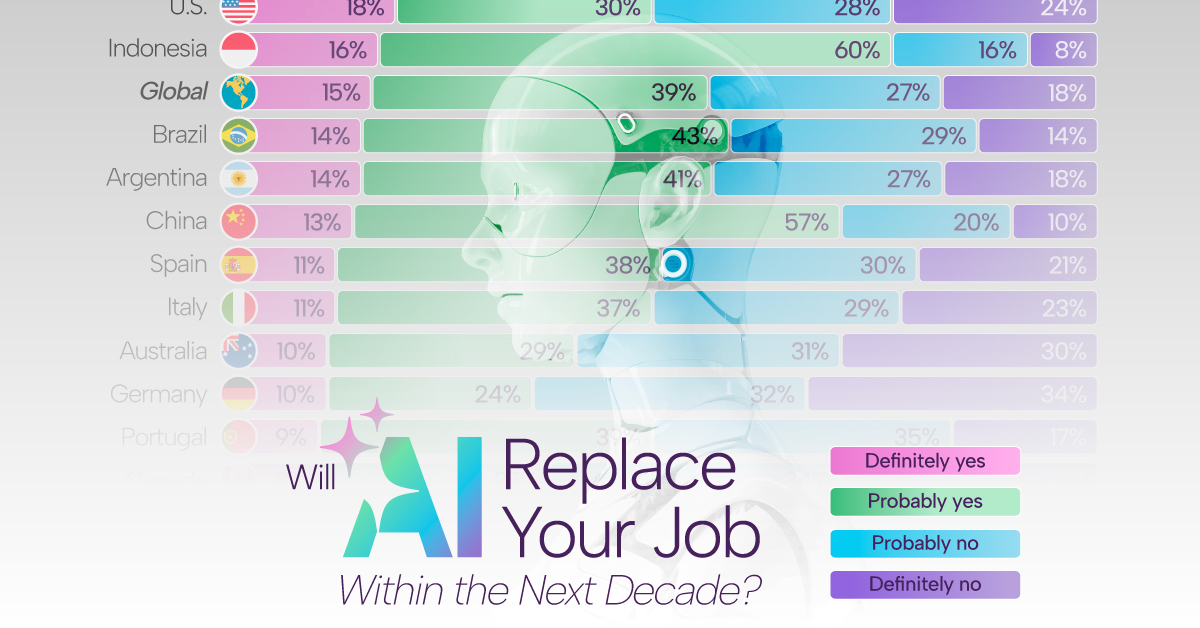Will AI Replace Your Job? Insights from a Global Survey
As artificial intelligence continues to advance, workers worldwide are grappling with the possibility of their jobs being automated. A recent survey conducted across 21 countries provides a fascinating look into how people perceive this threat over the next decade.
Key Findings from the Survey
- India, Pakistan, and Indonesia show the highest levels of concern, with over 70% of respondents believing their jobs will probably or definitely be replaced by AI.
- Globally, 54% of people expect their job to be replaced by a computer or machine in the next 10 years, indicating widespread anxiety about automation.
- In contrast, countries like Germany, Japan, and Canada are more skeptical, with lower percentages fearing job loss due to AI.
Data Source and Methodology
The data comes from the Global Public Opinion on Artificial Intelligence (GPO-AI) study, which surveyed over 1,000 people in each of the 21 countries. Respondents were asked to rate the likelihood of their job being replaced on a scale from "definitely yes" to "definitely no."
Here's a summary of the results in a table format for easy comparison:
| Country | Definitely Yes | Probably Yes | Probably No | Definitely No | |---------|----------------|--------------|-------------|---------------| | India | 36% | 39% | 17% | 8% | | Pakistan | 31% | 41% | 18% | 9% | | South Africa | 23% | 38% | 24% | 14% | | Mexico | 21% | 44% | 21% | 13% | | Kenya | 20% | 46% | 22% | 11% | | Chile | 20% | 44% | 20% | 16% | | U.S. | 18% | 30% | 28% | 24% | | Indonesia | 16% | 60% | 16% | 8% | | Global Average | 15% | 39% | 27% | 18% | | Brazil | 14% | 43% | 29% | 14% | | Argentina | 14% | 41% | 27% | 18% | | China | 13% | 57% | 20% | 10% | | Spain | 11% | 38% | 30% | 21% | | Italy | 11% | 37% | 29% | 23% | | Australia | 10% | 29% | 31% | 30% | | Germany | 10% | 24% | 32% | 34% | | Portugal | 9% | 39% | 35% | 17% | | Canada | 9% | 27% | 34% | 30% | | U.K. | 8% | 30% | 33% | 30% | | Poland | 8% | 31% | 36% | 26% | | France | 7% | 41% | 35% | 18% | | Japan | 5% | 38% | 39% | 18% |
Why Emerging Economies Are More Worried
In countries like India and Pakistan, the high fear of job replacement is linked to rapid technological adoption and a labor market focused on low-skilled, routine jobs that are more susceptible to automation. A study on Skill-Based Labor Market Polarization highlights that India faces a "double vulnerability," with employment concentrated in roles at high risk of automation.
Developed Nations Show More Confidence
Nations such as Canada, Germany, and Japan exhibit lower levels of concern, possibly due to stronger job protections, slower integration of AI, or a higher proportion of jobs requiring human interaction, which are safer from automation. Research indicates that roles involving personal care or creative tasks are less likely to be replaced by AI.
For more visual insights and data-driven charts, explore related content on platforms dedicated to economic and employment trends.



Comments
Join Our Community
Sign up to share your thoughts, engage with others, and become part of our growing community.
No comments yet
Be the first to share your thoughts and start the conversation!